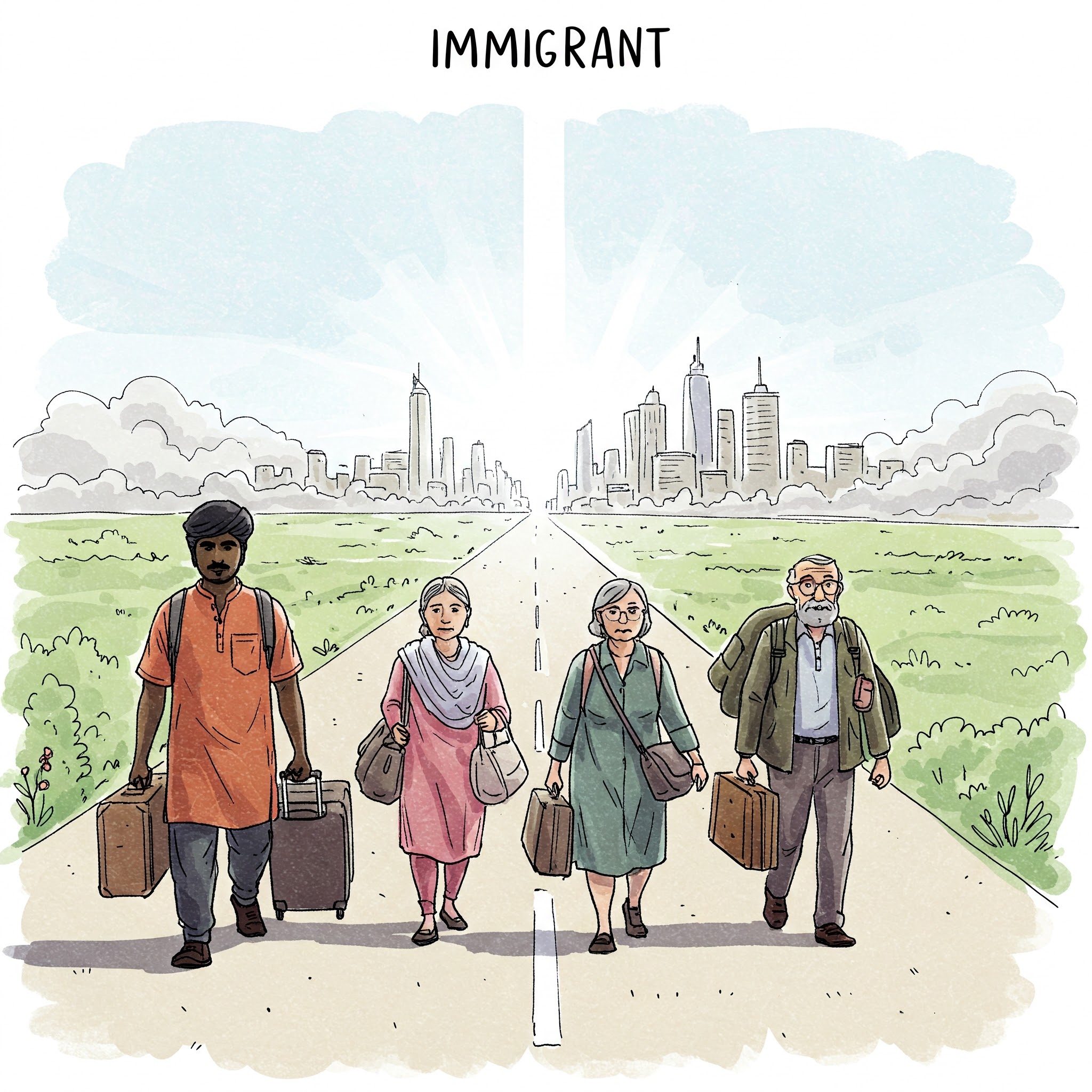Immigrant
Definition
Immigrant is a noun referring to a person who comes to live permanently in a foreign country. It can also describe individuals who have moved from their native land to another for various reasons, such as economic opportunities, safety, or family reunification.
Parts of Speech
- Noun
Pronunciation
American English
- IPA Pronunciation: /ˈɪm.ɪ.ɡrənt/
- Respelling: IM-ih-gruhnt
British English
- IPA Pronunciation: /ˈɪm.ɪ.ɡrənt/
- Respelling: IM-ih-gruhnt
Etymology
The word "immigrant" originates from the Latin "immigrāre," meaning "to go into" or "to migrate into." It entered English in the 17th century through the Late Latin term "immigrāns," the present participle of "immigrāre."
Derivatives
- Immigration (noun)
- Immigrate (verb)
- Immigrational (adjective)
- Immigrating (verb)
- Immigrantionist (noun)
Synonyms
- Migrant
- Expatriate
- Settler
Antonyms
- Emigrant
- Native
- Local
Usage
The term "immigrant" is used in social, economic, and political contexts to discuss individuals moving to a new country. For example, "The United States has a large immigrant population," or "She is an immigrant from Canada."
Related Terms
- Migration: The movement of people from one place to another.
- Asylum seeker: Someone who seeks protection in another country.
- Expatriate: A person temporarily or permanently residing in a foreign country.
Detailed Definitions
Noun
- A person who comes to live permanently in a foreign country: Refers to an individual who relocates to a new nation with the intention of establishing a long-term residence.
- Example: "The immigrant community has contributed greatly to the country's economy."
- An individual relocating for safety or opportunity: Often used in discussions about people seeking better living conditions or escaping conflicts.
- Example: "Many immigrants left their homeland in search of a better future."
immigrant



🇨🇳 Mandarin (Simplified Chinese)
- 移民 (yímín)
- IPA: /i˧˥ min˨˩˦/
- Respell in English: yi-min
🇮🇳 Hindi
- प्रवासी (pravasi)
- IPA: /pɾə.ʋɑː.siː/
- Respell in English: pra-va-si
🇪🇸 Spanish
- Inmigrante
- IPA: /inmi'grante/
- Respell in English: in-mi-gran-te
🇫🇷 French
- Immigrant
- IPA: /imigrã/
- Respell in English: imi-gran
🇸🇦 Modern Standard Arabic
- مهاجر (muhajir)
- IPA: /muhaːʒir/
- Respell in English: mu-ha-jir
🇧🇩 Bengali
- অভিবাসী (abhivasi)
- IPA: /obʱibasi/
- Respell in English: o-bhi-ba-si
🇷🇺 Russian
- Иммигрант (Immigrant)
- IPA: /ɪmːɪˈɡrant/
- Respell in English: im-mi-grant
🇵🇹 Portuguese
- Imigrante
- IPA: /i.mi.ɣɾɐ̃.tɨ/
- Respell in English: i-mi-gran-te
🇮🇩 Indonesian
- Imigran
- IPA: /imigran/
- Respell in English: imi-gran
🇩🇪 German
- Einwanderer
- IPA: /ˈaɪ̯n.van.dəʁɐ/
- Respell in English: ein-wan-der-er
🇯🇵 Japanese
- 移民 (ijin)
- IPA: /i.dʑiɴ/
- Respell in English: i-jin
🇻🇳 Vietnamese
- Dân di cư
- IPA: /ɗaːn˧˥ zi ku˧˥/
- Respell in English: dan di cu
🇰🇷 Korean
- 이민자 (iminja)
- IPA: /i.min.dʑa/
- Respell in English: i-min-ja
🇹🇷 Turkish
- Göçmen
- IPA: /ɟøtʃˈmen/
- Respell in English: goc-men
🇵🇰 Urdu
- مہاجر (muhajir)
- IPA: /mʊhɑːdʒɪr/
- Respell in English: mu-ha-jir





